Special Report
The Best Counties to Live In

Published:
Last Updated:

An estimated 11.2% of Americans changed residences last year. Some of these left their homes for a new city, or suburb, looking for a better job and quality of life. If they moved to one of several counties, they likely have found themselves surrounded by people living rich, healthy lives, relatively free from financial struggle.
To determine the best counties to live in, 24/7 Wall St. developed an index based on three social measures — educational attainment, poverty rate, and life expectancy — and ranked counties based on their well-being.
[in-text-ad]
All but a few of the healthiest, best educated, and most financially-secure U.S. counties are located within a major metropolitan area. Of the counties on this list, three are located within commuting distance of downtown San Francisco, another three are within commuting distance of New York City, and eight are within commuting distance of Washington D.C.
Click here to see the best counties to live in.
Click here to see the worst counties to live in.
Major cities such as these offer a wide range of jobs, including many that are especially high paying. In every county on this list, the median annual household income is at least $17,000 higher than the $53,889 national median income. In many cases, the typical county household earns more than $100,000.
In the counties in and around the D.C. metro area, many of the high-paying companies are government contractors. Defense contractors such as Lockheed Martin, General Dynamics, and Northrop Grumman are headquartered around the nation’s capital and receive billions of dollars in government contracts annually.
In the New York metro area, high-paying jobs in the city’s finance sector likely contributed to high incomes in some of the area’s counties. On the other side of the country, many counties on this list are located in and around San Francisco and Silicon Valley. Major, high paying, employers in the area include tech giants Apple, Facebook, and Google.
People living in these counties are not just more likely than those in other parts of the country to find high-paying work, but are also more likely to have a job in general. The unemployment rate in all but three of the 25 counties on this list is more than a percentage point below the U.S. rate of 4.6%.
The high employment rate may help explain another positive aspect in these counties, high health insurance coverage. Nationwide, 87% of Americans have health insurance coverage. All but three counties on this list have a higher health insurance coverage rate. In five of the counties on this list, the coverage rate is 95% or more.
Such high health insurance coverage can help explain the long life expectancy in these counties. People with health insurance coverage are more likely to get life-saving treatment when they need it and are also more likely to receive regular preventive care that can prolong life.
Not surprisingly, many of these healthy, educated, and economically vibrant counties are growing rapidly. The populations of only two counties on this list have decreased in size in the last half decade, and 20 have grown faster than the 4.1% national population growth rate. Loudoun County, Virginia’s population ballooned by 20%, about five times faster than the national population growth rate.
To identify the best counties in which to live, 24/7 Wall St. created an index composed of three socioeconomic measures — the poverty rate, the percentage of adults who have at least a bachelor’s degree, and life expectancy at birth — and ranked counties based on the index. The selection of these three measures was inspired by the United Nations’ Human Development Index. Poverty, insurance, and bachelor attainment rates came from the U.S. Census Bureau’s 2015 American Community Survey. Population data also came from the ACS. Life expectancies at birth are from the Institute for Health Metrics and Evaluation, a health research center affiliated with the University of Washington, and are for 2013. Unemployment rates are from the Bureau of Labor Statistics and are for November 2016. Independent cities in Virginia are treated as counties by the U.S. Census Bureau and were included on this list for that reason.
These are the 25 best counties to live in.

25. San Mateo County, California
> 5-yr. population change: +6.3%
> Nov. unemployment rate: 2.8%
> Poverty rate: 8.0%
> Life expectancy at birth: 83.3 years
Based on a number of socioeconomic measures, San Mateo is one of the best U.S. counties to live in. Higher educational attainment can open doors to higher paying jobs. In San Mateo, some 45.6% of adults have at least a bachelor’s degree, well above the 29.8% of adults nationwide. Incomes in the area are also high. The typical county household earns over $93,600 a year, well above the $53,889 national median annual income.
High educational attainment and high incomes are indicative of the types of jobs available in the area. Many San Mateo County residents work in high-paying tech jobs in nearyby Silicon Valley, while others likely benefit from employment opportunities in San Francisco.
[in-text-ad]
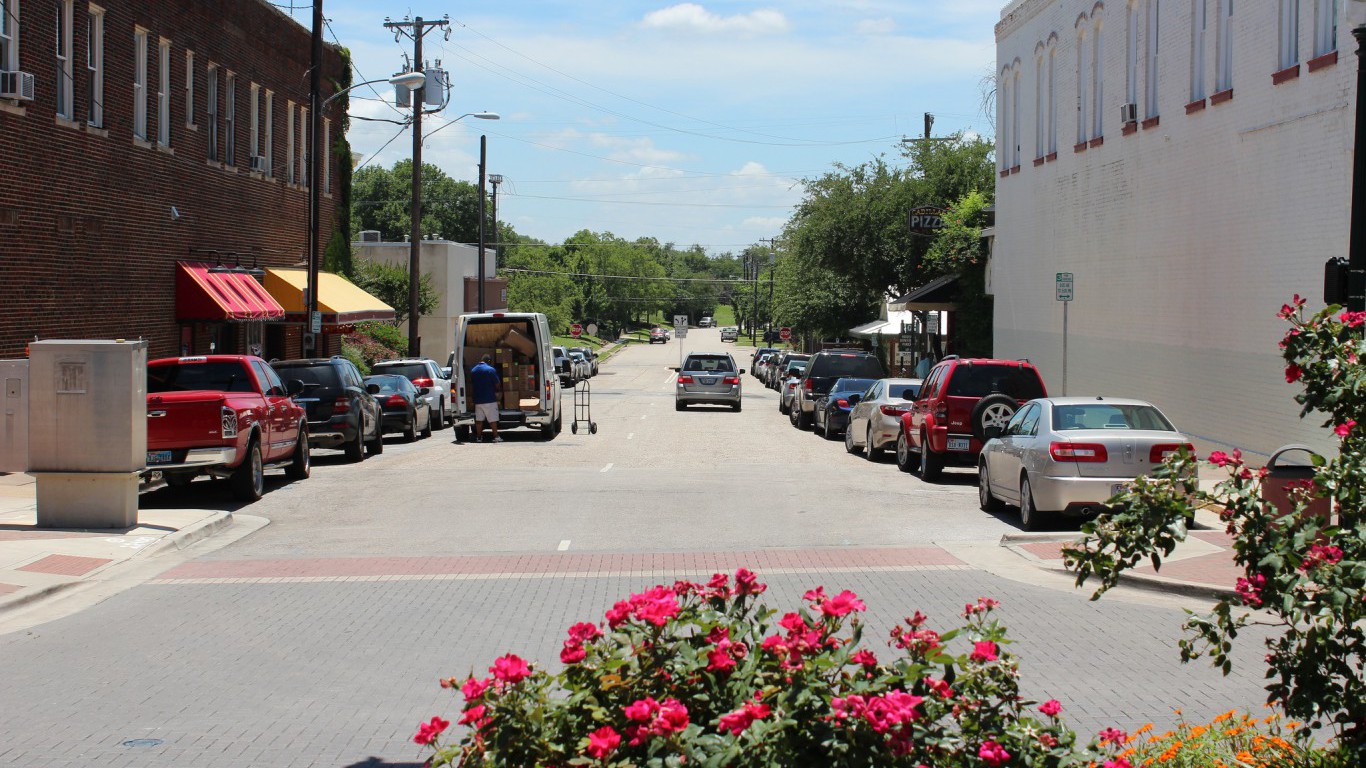
24. Collin County, Texas
> 5-yr. population change: +16.7%
> Nov. unemployment rate: 3.2%
> Poverty rate: 7.6%
> Life expectancy at birth: 82.1 years
Collin is the only county in Texas to rank among the 25 best places to live nationwide. Major cities typically offer a wide range of employment opportunities, including many high-paying jobs, and many Collin County residents live within commuting distance of two of the state’s largest cities, Dallas and Fort Worth. Perhaps as a result, only 3.2% of the county’s labor force is out of a job, well below the 4.6% national unemployment rate.
Like many areas with healthy job markets and other favorable living conditions, Collin’s population is on the rise. Over the past five years, the county’s population grew by 16.7%, more than four times faster than the national average growth over that period.

23. Santa Clara County, California
> 5-yr. population change: +7.4%
> Nov. unemployment rate: 3.5%
> Poverty rate: 9.5%
> Life expectancy at birth: 83.4 years
Silicon Valley, a hotbed of technological innovation, is located primarily within Santa Clara County, California. Among a slew of newer companies, the area is also home to the headquarters of such tech giants as Apple, Facebook, and Google. Jobs at such companies tend to be high paying and typically require at least a college education. Close to 50% of county adults have at least a bachelor’s degree, well above the comparable 29.8% share of adults nationwide. Additionally, the typical county household earns $96,310 a year, well above the $53,889 national median.
Like most counties with high educational attainment rates, average life expectancy is high in Santa Clara. At 83.4 years, life expectancy in the county is higher than in all but half a dozen U.S. counties.

22. Carver County, Minnesota
> 5-yr. population change: +7.9%
> Nov. unemployment rate: 2.8%
> Poverty rate: 4.4%
> Life expectancy at birth: 82.5 years
Some of the best predictors of personal well-being and longevity are income and access to medical care. In Carver County, Minnesota, only 4.4% of the population lives in poverty, less than a third of the 15.5% national poverty rate. In addition, only 4.3% of county residents lack health insurance, also less than a third of the 13.0% national uninsured rate. Such positive socioeconomic conditions help explain the county’s relatively high life expectancy, which at 82.5 years is 3.6 years longer than the national life expectancy.
Carver County is within commuting distance of downtown Minneapolis and St. Paul. Like other counties on this list, access to major urban centers is likely a major advantage for area county residents.
[in-text-ad-2]

21. Middlesex County, Massachusetts
> 5-yr. population change: +5.2%
> Nov. unemployment rate: 2.1%
> Poverty rate: 8.3%
> Life expectancy at birth: 82.1 years
Middlesex County, situated in eastern Massachusetts largely to the north and east of Boston, is the only New England county to rank among the best places to live. The Boston metro area has a high concentration of colleges and universities, and partially as a result, Middlesex County is one of the best educated areas in the country. Over half of all county adults have at least a bachelor’s degree, well above the 29.8% national college attainment rate.
Many high paying jobs require a college education, and in Middlesex County, higher educations appear to be paying off. The typical Middlesex household earns $85,118 a year, well above the $53,889 national median income.
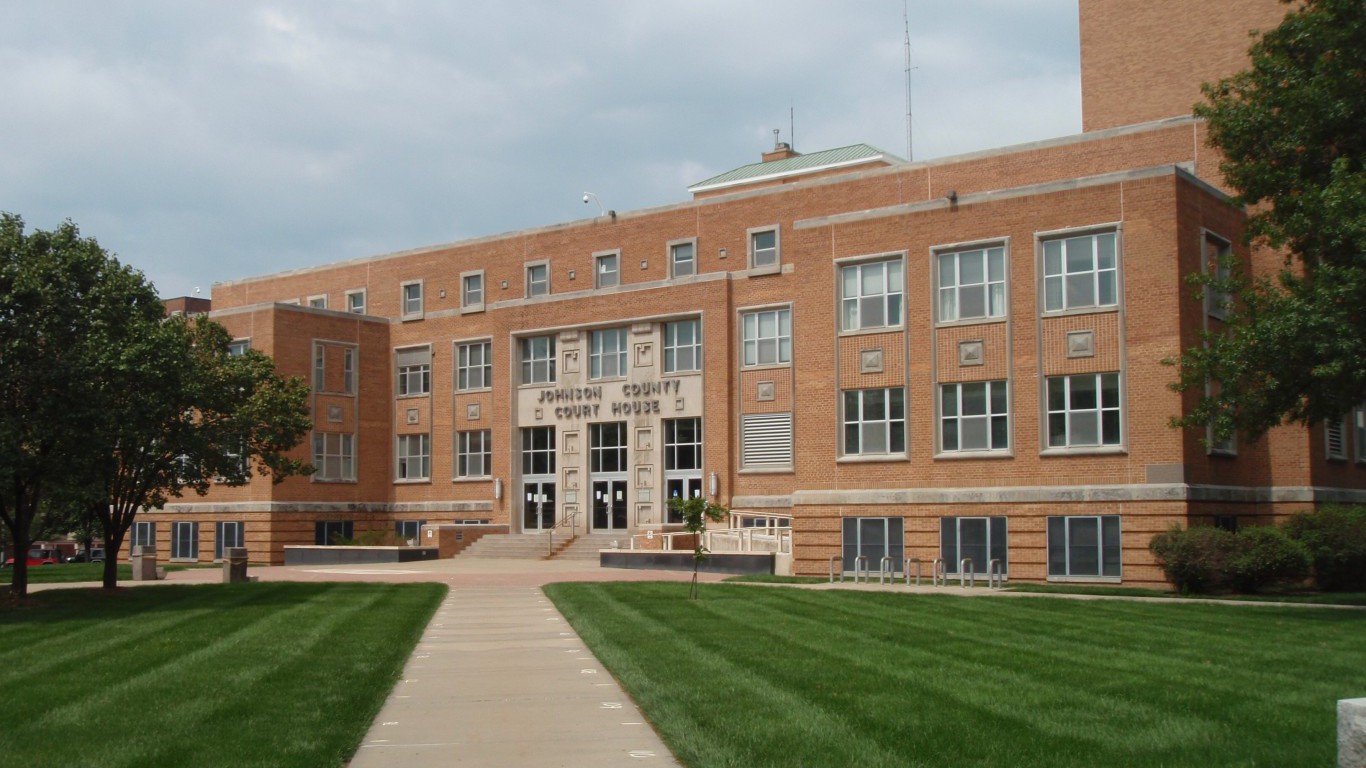
20. Johnson County, Kansas
> 5-yr. population change: +6.7%
> Nov. unemployment rate: 3.1%
> Poverty rate: 6.2%
> Life expectancy at birth: 81.6 years
Johnson County is located just south of downtown Kansas City, Kansas. It is also one of the best counties to live in nationwide. Members of the area’s labor force are far more likely to have a high paying job than American workers across the country. A typical county household earns an annual income of $76,113, about $22,000 more than the national median.
Also, just 3.1% of the area’s labor force is unemployed compared to the national unemployment rate of 4.6%. A large share of Americans get health insurance coverage through their employers, and the low unemployment rate may help explain why such a large share of Johnson County residents have health coverage. Just 7.2% of county residents lack health coverage, well below the national uninsured rate of 13%.
[in-text-ad]
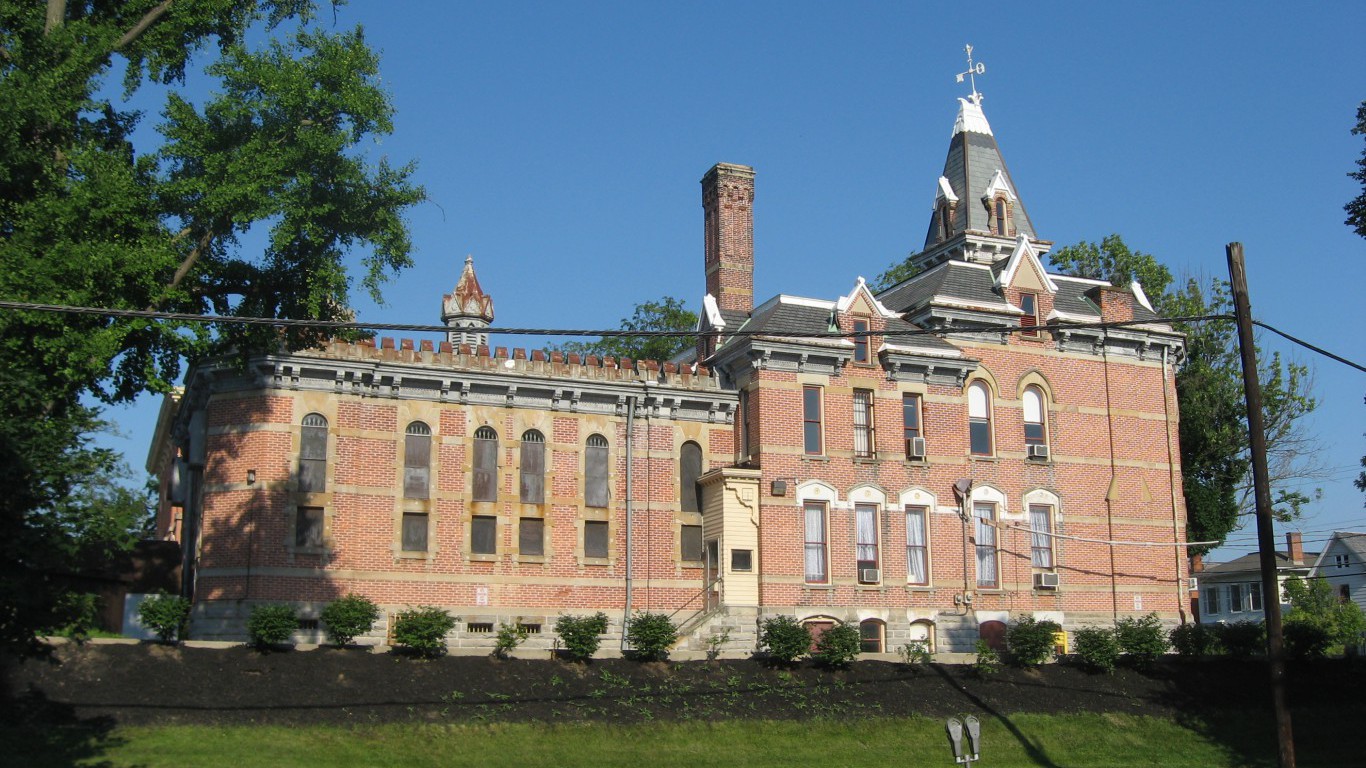
19. Delaware County, Ohio
> 5-yr. population change: +11.6%
> Nov. unemployment rate: 3.2%
> Poverty rate: 4.5%
> Life expectancy at birth: 81.4 years
The median household income of $91,955 a year in Delaware County, Ohio is by far the highest in the state. High incomes are partially attributable to high educational attainment. Delaware County is the only area in the Buckeye State where over half of all adults have a bachelor’s degree.
Delaware County is located near Columbus, the state’s capitol, just north of the city’s beltway. In addition to the Ohio government, many private sector employers also operate in the city. Major employers in the Columbus region include JP Morgan Chase, Nationwide Mutual Insurance, and Honda of America Manufacturing.

18. Hunterdon County, New Jersey
> 5-yr. population change: -1.7%
> Nov. unemployment rate: 3.0%
> Poverty rate: 4.4%
> Life expectancy at birth: 82.2 years
Hunterdon is one of several New Jersey counties on this list that are home to wealthy New York City commuters. The typical Hunterdon household earns an annual income of over $105,000, sixth highest among U.S counties. The county almost entirely consists of financially secure individuals and families as just 4.4% of the population lives in poverty, which is not only less than a third of the national poverty rate of 15.5%, but also lower than in all but a handful of other U.S. counties. Wealthier, healthier counties tend to be desirable places to live, and in most of the areas on this list the populations are growing faster than the rest of the country. Hunterdon is a notable exception, as the county’s population declined by 1.7% over the past five years.

17. Morris County, New Jersey
> 5-yr. population change: +1.7%
> Nov. unemployment rate: 3.2%
> Poverty rate: 4.5%
> Life expectancy at birth: 82.3 years
Morris County, New Jersey is one of only 11 counties in the United States with a six-figure median annual household income. With over half of all area households earning at least $100,000 a year, relatively few area residents face serious financial hardship. Only 4.5% of Morris County’s nearly half a million residents live in poverty, less than a third of the national 15.5% poverty rate.
Morris County is within commuting distance of New York City, one of the largest most diverse job markets in the country. The relative availability of jobs in the area likely reduces the share of county workers out of a job. Morris County’s 3.2% unemployment rate is well below the 4.6% national unemployment rate.
[in-text-ad-2]

16. Somerset County, New Jersey
> 5-yr. population change: 3.5%
> Nov. unemployment rate: 3.3%
> Poverty rate: 5.0%
> Life expectancy at birth: 82.4 years
In Somerset County, New Jersey, 52.5% of adults have at least a bachelor’s degree, one of the highest shares of any county and well above the nationwide share of 29.8% of adults. Residents with a college education are more likely to be employed in high-paying industries. The typical household in Somerset earns an annual income of $100,667, 10th highest among all U.S. counties. Higher education and incomes are tied to better health outcomes, which may help explain Somerset’s 82.4 year life expectancy, more than three years longer than the national life expectancy at birth.

15. Teton County, Wyoming
> 5-yr. population change: +7.3%
> Nov. unemployment rate: 5.6%
> Poverty rate: 7.4%
> Life expectancy at birth: 82.9 years
Situated in western Wyoming along the border with Idaho, much of Teton County consists of nationally protected parks and forests, including parts of Yellowstone National Park and Bridger-Teton National Forest. Partially as a result, it is sparsely populated.
Home to only 22,300 people, Teton County is one of the best places to live in the nation. At nearly 83 years, life expectancy at birth in the county is higher than in all but 11 other U.S. counties. Higher education and incomes are often tied to longer life expectancies, and in Teton County, 53.9% of adults have at least a bachelor’s degree, a far larger share than the 29.8% of adults nationwide.
[in-text-ad]

14. Montgomery County, Maryland
> 5-yr. population change: +7.5%
> Nov. unemployment rate: 3.1%
> Poverty rate: 6.7%
> Life expectancy at birth: 81.6 years
Many of the wealthiest, best educated, and healthiest counties in the United States are located in and around the Washington D.C metro area, and Montgomery County is one of them. Many workers living in the county are employed in high-paying jobs in and around the nation’s capital. The typical household in Montgomery earns $99,435 a year, a higher median income than in all but a dozen other U.S. counties.
People with higher educational attainment tend to live longer than those with less education. In Montgomery, 57.9% of adults have at least a bachelor’s degree, a larger share than in all but 10 other U.S. counties. With high educational attainment, the county’s 81.6 year life expectancy at birth is nearly three years longer than the national life expectancy.

13. Hamilton County, Indiana
> 5-yr. population change: +13.5%
> Nov. unemployment rate: 3.0%
> Poverty rate: 4.7%
> Life expectancy at birth: 81.8 years
Many wealthy suburbs of Indianapolis are located within Hamilton County, Indiana. Job availability in Indianapolis, the second largest city in the Midwest, likely contributes to a low unemployment rate in Hamilton. Only 3.0% of county workers are out of work, well below the 4.6% U.S. unemployment rate. Due in part to a healthy job market, incomes in Hamilton County are high, and serious financial hardship is uncommon. The typical county household earns $86,222 a year, about $32,333 more than the typical American household, and only 4.7% of county residents live in poverty, less than a third of the national poverty rate.
Like many of the best places to live in nationwide, Hamilton County’s population is growing. In the last half decade, the number of people living in Hamilton increased by 13.5%, far outpacing the national 4.1% population growth.

12. Williamson County, Tennessee
> 5-yr. population change: +14.5%
> Nov. unemployment rate: 3.4%
> Poverty rate: 5.1%
> Life expectancy at birth: 82.2 years
One of the clearest signs a regional economy has a healthy job market and is a desirable place to live is robust population growth. The U.S. population grew by 4.1% over the last five years. Over that same period, Williamson County, Tennessee’s population grew by 14.5%.
The county, part of the Nashville metropolitan area, has a median annual household income of $96,565 and a poverty rate of just 5.1%, each among the best of any U.S. county. A number of large health institutions operate in the area, including Community Health Systems and Williamson Medical Center, providing stable employment to a significant portion of area workers.
[in-text-ad-2]

11. Pitkin County, Colorado
> 5-yr. population change: +6.3%
> Nov. unemployment rate: 5.4%
> Poverty rate: 9.9%
> Life expectancy at birth: 83.1 years
Pitkin is one of two counties in Colorado to rank among the best areas in the country to live. Health insurance coverage increases the likelihood of regular doctor visits and indicates the level of access to medical care in an area. While higher health insurance coverage rates almost always accompany relatively high life expectancy, Pitkin County is an exception to this pattern. Some 14.2% of the population is uninsured, a larger share than the 13.0% of uninsured Americans. On the other hand, life expectancy at birth in Pitkin County is 83.1 years, over four years longer than life expectancy across the United States.
High educational attainment in Pitkin County may partially explain the residents’ longevity. Better educated individuals tend to live longer than those with lower educational attainment, and in Pitkin County, 59.1% of adults have at least a bachelor’s degree, a larger share than in all but seven other counties.

10. Alexandria Independent City, Virginia
> 5-yr. population change: +11.7%
> Nov. unemployment rate: 3.0%
> Poverty rate: 8.3%
> Life expectancy at birth: 81.9 years
Alexandria is one of three independent Virginia cities on this list. Alexandria operates independently of any county but essentially performs the same functions. Situated on the west bank of the Potomac River and within the Washington D.C. Beltway, Alexandria residents benefit from high-paying jobs in and around the nation’s capital. The typical area household earns over $89,134 a year, well above the $53,889 national median income.
Many high paying jobs require a college education, and in Alexandria, 61.4% of adults have at least a bachelor’s degree, more than double the 29.8% share of adults nationwide.
[in-text-ad]

9. Marin County, California
> 5-yr. population change: +3.9%
> Nov. unemployment rate: 3.0%
> Poverty rate: 8.3%
> Life expectancy at birth: 83.8 years
Marin County, California, is part of the San Francisco metropolitan area, one of the most prosperous regions of the country. Marin has among the wealthiest, most highly-educated populations in the nation. The typical household earns an annual income of $93,257, compared to the U.S. median household income of $53,889. Well over half of the area’s adults have a bachelor’s degree, one of the highest proportions in the country.
Wealthier, more highly educated populations tend to be healthier on the whole, and few counties have healthier populations than Marin. Life expectancy at birth in the area is 83.8 years, the third highest of any U.S. county.
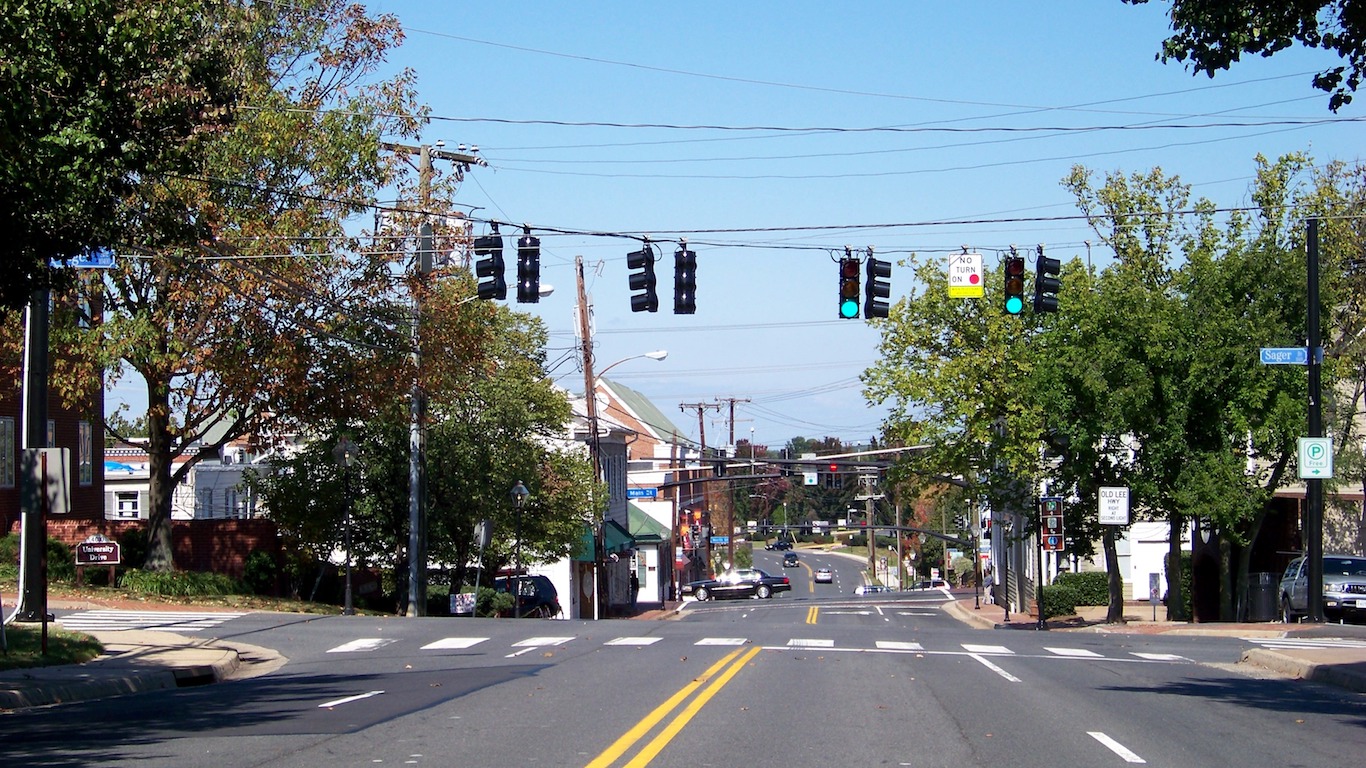
8. Fairfax Independent City, Virginia
> 5-yr. population change: +6.1%
> Nov. unemployment rate: 3.0%
> Poverty rate: 7.0%
> Life expectancy at birth: 83.8 years
Though it is surrounded by Fairfax County, the city of Fairfax remains independent of the broader county jurisdiction. The city of Fairfax is one of the wealthiest areas in the country. The typical area household earns $105,297 a year, more than in all but six other U.S. counties.
As in many other wealthy areas in Virginia, some high earners in Fairfax are likely employed by the government or government contractors. Fairfax is located just outside the Beltway, within commuting distance to the nation’s capital and surrounding areas.

7. Los Alamos County, New Mexico
> 5-yr. population change: -0.8%
> Nov. unemployment rate: 4.2%
> Poverty rate: 6.1%
> Life expectancy at birth: 81.4 years
Los Alamos is the only county in New Mexico to rank among the best places to live. An especially wealthy area, Los Alamos is one of only 11 U.S. counties where the typical household earns over $100,000 annually. Los Alamos is also home to one of the most highly educated populations. Some 64.2% of area adults have at least a bachelor’s degree, a larger share than in all but two other U.S. counties.
The Los Alamos National Laboratory is the backbone of the local economy. Owned by the Department of Energy, the lab allocates a majority of its $2.45 billion annual budget to weapons development. Some 10,500 people are employed by the national laboratory.
[in-text-ad-2]
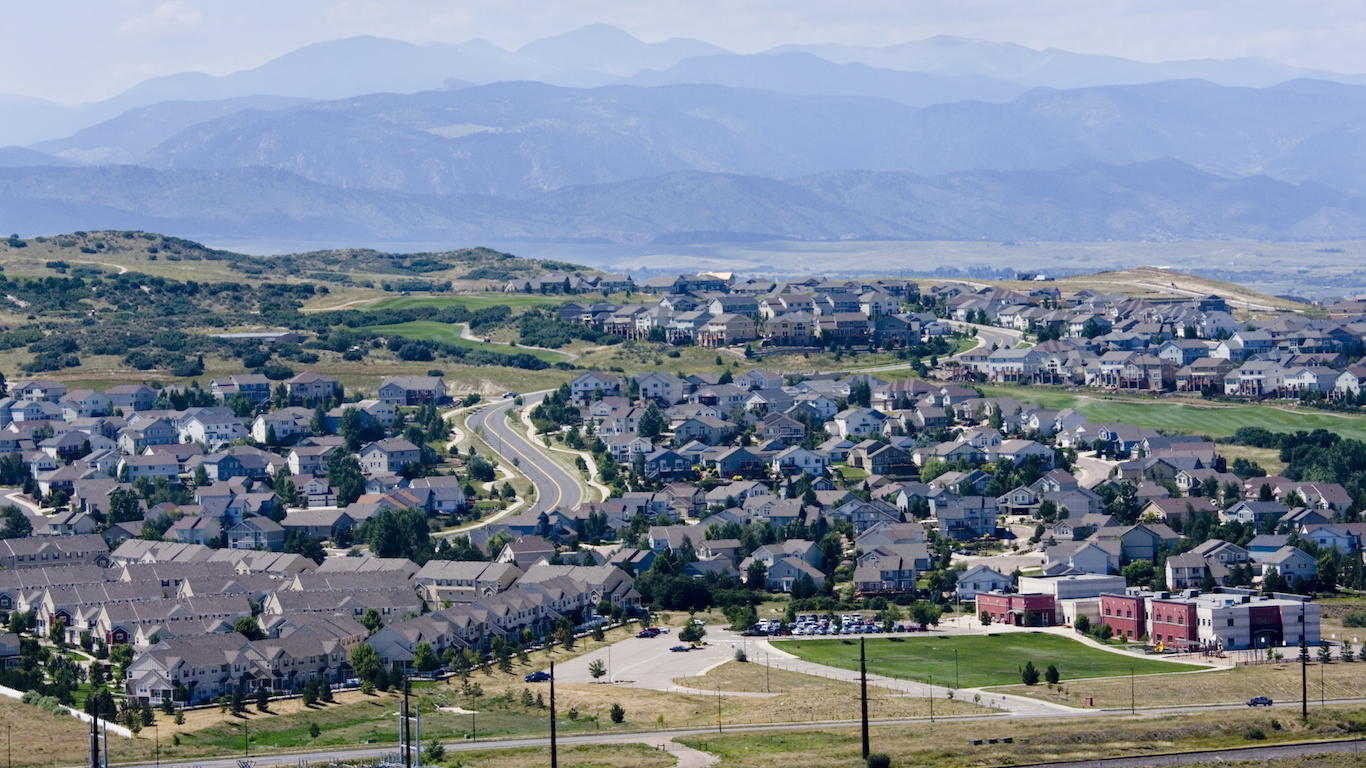
6. Douglas County, Colorado
> 5-yr. population change: +12.3%
> Nov. unemployment rate: 2.3%
> Poverty rate: 4.0%
> Life expectancy at birth: 83.5 years
In Douglas County, part of the Denver metropolitan area, a number of major employers are in the medical, software, and financial services sectors, all of which tend to pay relatively well compared to other sectors. The typical county household earns over $100,000 annually, among the highest of any county and close to double the national median.
Just 2.3% of the Douglas County labor force is unemployed, half the national unemployment rate. Employer-sponsored plans are the most common form of health care for working-age Americans, and the extremely low unemployment rate helps explain the area’s high health insurance coverage. While 13% of the U.S. population lacks health insurance coverage, just 5% of Douglas County residents are uninsured.
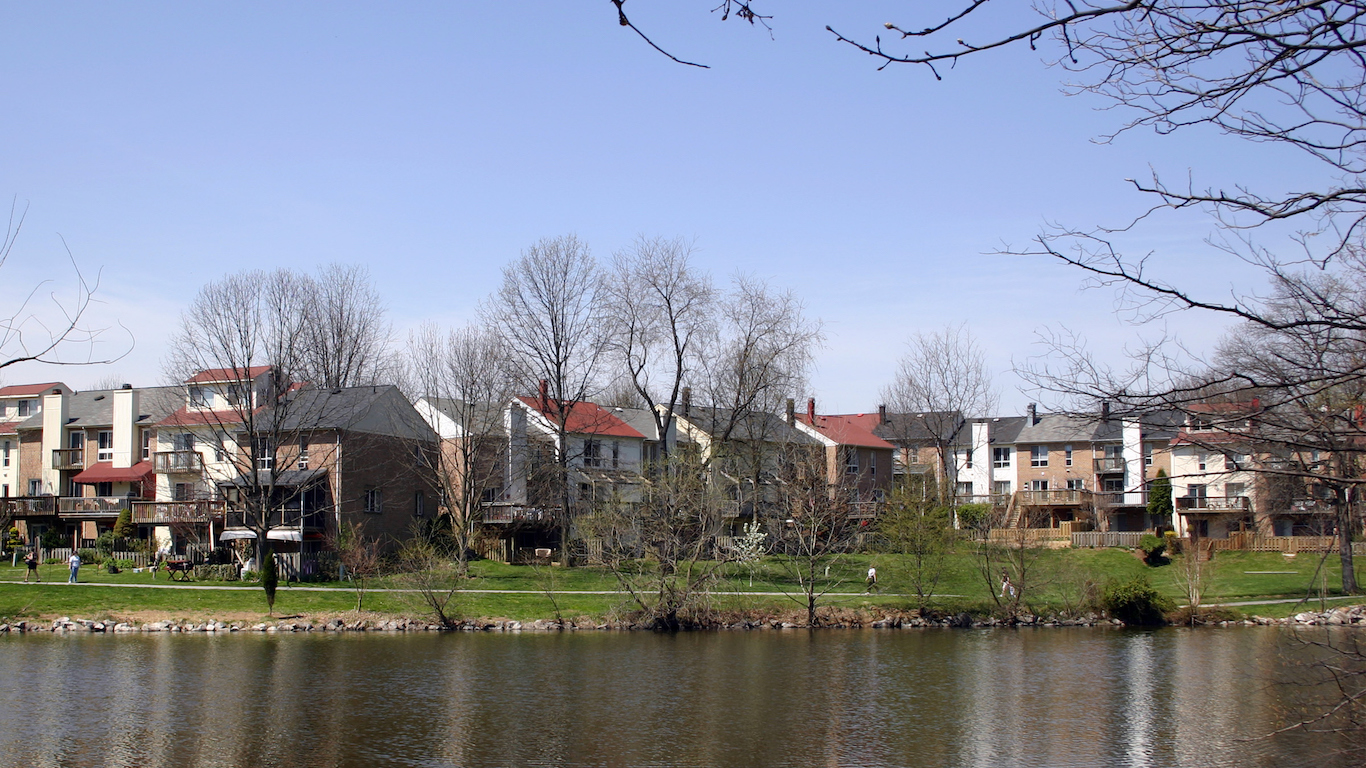
5. Howard County, Maryland
> 5-yr. population change: +8.9%
> Nov. unemployment rate: 3.0%
> Poverty rate: 5.2%
> Life expectancy at birth: 83.0 years
As is the case with its neighbor, Montgomery County, Howard County residents are among the healthiest, most highly educated, and financially secure in the United States. About 61% of adult residents have at least a bachelor’s degree, making Howard one of only seven U.S. counties with a bachelor’s degree attainment rate that is more than double the comparable national figure.
People with higher educational attainment tend to live longer, healthier lives than those with lower educational attainment, and Howard County fits this trend. Life expectancy at birth in Howard is 83 years, more than four years longer than it is nationwide.
[in-text-ad]

4. Loudoun County, Virginia
> 5-yr. population change: +20.4%
> Nov. unemployment rate: 3.2%
> Poverty rate: 4.0%
> Life expectancy at birth: 83.4 years
Loudoun County, Virginia is one of the fastest growing areas in the United States. In the last half decade, the population has increased by more than 20%, five times faster than the comparable 4% national population growth.
A healthy economy and a healthy population are two possible explanations for the rapid growth. Only 3.2% of the area’s labor force are out of a job, well below the 4.6% national unemployment rate. Also, the typical area household earns $123,453 annually, more than any other U.S. county. In addition, life expectancy at birth in Loudoun County is 83.4 years, or 4.5 years longer than the national average.

3. Fairfax County, Virginia
> 5-yr. population change: +7.6%
> Nov. unemployment rate: 3.2%
> Poverty rate: 6.0%
> Life expectancy at birth: 83.8 years
Like many of the healthiest, most highly-educated, and financially secure counties, Fairfax County is located in the Washington D.C. metro area. The typical Fairfax County household earns $112,552 a year, more than double the national median household income.
Many area residents have high-paying jobs with nearby government contractors. Major defense contractor General Dynamics, which received some $13.63 billion in federal dollars in the 2015 government fiscal year, is headquartered within commuting distance of Fairfax County and is one of the area’s largest employers.

2. Arlington County, Virginia
> 5-yr. population change: +13.4%
> Nov. unemployment rate: 2.7%
> Poverty rate: 9.0%
> Life expectancy at birth: 82.8 years
Another wealthy Virginia county that is part of the Washington D.C. metropolitan area, Arlington reports a median annual household income of close to $106,000 — nearly double the national median income. Arlington is home to a number of high-paid workers employed directly or indirectly by the government. The county’s largest employer is the U.S. Department of Defense, and the Department of Homeland Security is third. Several consulting firms, which are also more likely to pay well, are among Arlington’s largest employers. Higher-paying jobs in this industry and others tend to require at least a bachelor’s degree, and Arlington has one of the most college-educated populations in the country. While less than 30% of all U.S. adults have a bachelor’s degree, 72.9% of Arlington adults have a college education — the second highest share of any county.
[in-text-ad-2]

1. Falls Church Independent City, Virginia
> 5-yr. population change: +16.1%
> Nov. unemployment rate: 2.7%
> Poverty rate: 2.7%
> Life expectancy at birth: 82.7 years
Falls Church operates independently of any broader county. Falls Church is relatively small, with a total area of just 2.2 square miles. The 13,000 people who call it home are more likely to be healthy, college educated, and financially secure than residents of any other county or county equivalent in the United States.
The typical area household earns $120,522 a year, well more than double the $53,889 national median income. In addition to a high typical household income, relatively few families experience serious financial hardship. Only 2.7% of area residents live in poverty, a fraction of the 15.5% national poverty rate. Many high earners in Falls Church likely work for government contractors. Some of the biggest employers in northern Virginia include Northrop Grumman, Lockheed Martin, and Boeing, and General Dynamics — which are some of the largest defense contractors nationwide.
Let’s face it: If your money is just sitting in a checking account, you’re losing value every single day. With most checking accounts offering little to no interest, the cash you worked so hard to save is gradually being eroded by inflation.
However, by moving that money into a high-yield savings account, you can put your cash to work, growing steadily with little to no effort on your part. In just a few clicks, you can set up a high-yield savings account and start earning interest immediately.
There are plenty of reputable banks and online platforms that offer competitive rates, and many of them come with zero fees and no minimum balance requirements. Click here to see if you’re earning the best possible rate on your money!
Thank you for reading! Have some feedback for us?
Contact the 24/7 Wall St. editorial team.